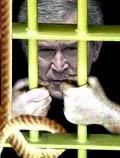| Find |
Saturday, 26 January 2008
Critics Fear Pact Will Tie Next President's Hands
As President George W. Bush seeks to deeply entrench U.S. military forces in Iraq, the Congress and foreign policy pundits are looking beyond his term and debating the future of U.S. foreign policy there. Violence is down in Iraq, and Bush hopes to use the apparent success of his surge strategy to solidify the relationship that he has laid out with the government of Iraqi Prime Minister Nouri al-Maliki. For Bush, that constitutes a longstanding commitment to Iraqi security.
Violence is down in Iraq, and Bush hopes to use the apparent success of his surge strategy to solidify the relationship that he has laid out with the government of Iraqi Prime Minister Nouri al-Maliki. For Bush, that constitutes a longstanding commitment to Iraqi security.
But there is concern among the Democrats that Bush is trying to shore up an Iraq policy within which the next president will be forced to operate.
In November, Bush and Maliki signed a declaration of principles around which an agreement is to be negotiated by July. The agreement is meant to replace the United Nations mandate -- set to expire next December -- which allows foreign troops on Iraqi soil.
With many cheerleaders of the war, such as Republican presidential candidate Sen. John McCain, calling for an extended U.S. troop presence in Iraq, the security aspect of the agreement will set policy beyond the next president's inauguration on Jan. 20, 2009.
Democrats have been railing against the idea that Bush is in a position to make these commitments. Presidential hopefuls Hillary Clinton and Barack Obama both say they will pursue legislation requiring President Bush to seek congressional approval for the Iraq status of forces agreement, and a joint subcommittee meeting was convened on the topic Wednesday in the House of Representatives.
'The next president is going to inherit a situation where, maybe if they're lucky, there has been enough peace in the meantime for political progress to be made,' said Phillip Gordon of the Brookings Institution at an event there. 'But more likely is that any of these factors that I mention leads to a situation in which the president is actually faced with the dilemma that we've been facing for the past four years, which is 'Is it worth it?' More
Posted at
18:55
![]()
Post Title: Critics Fear Pact Will Tie Next President's Hands
![[Zionazis-1.jpg]](https://blogger.googleusercontent.com/img/b/R29vZ2xl/AVvXsEg_x8DOGucgHQmfJJujuK_oYJdxhEnskhQqt-Og7lSk52HeaDQYzW8NQWfdpHmPgj_FJN0jJ3tz1prR1jVZHdHky2HDQxxcs4LVxX0DtAt3fG0sfRr6MDx7Sz8cJNjl0k0RS9TbCjangQ/s1600/Zionazis-1.jpg)




